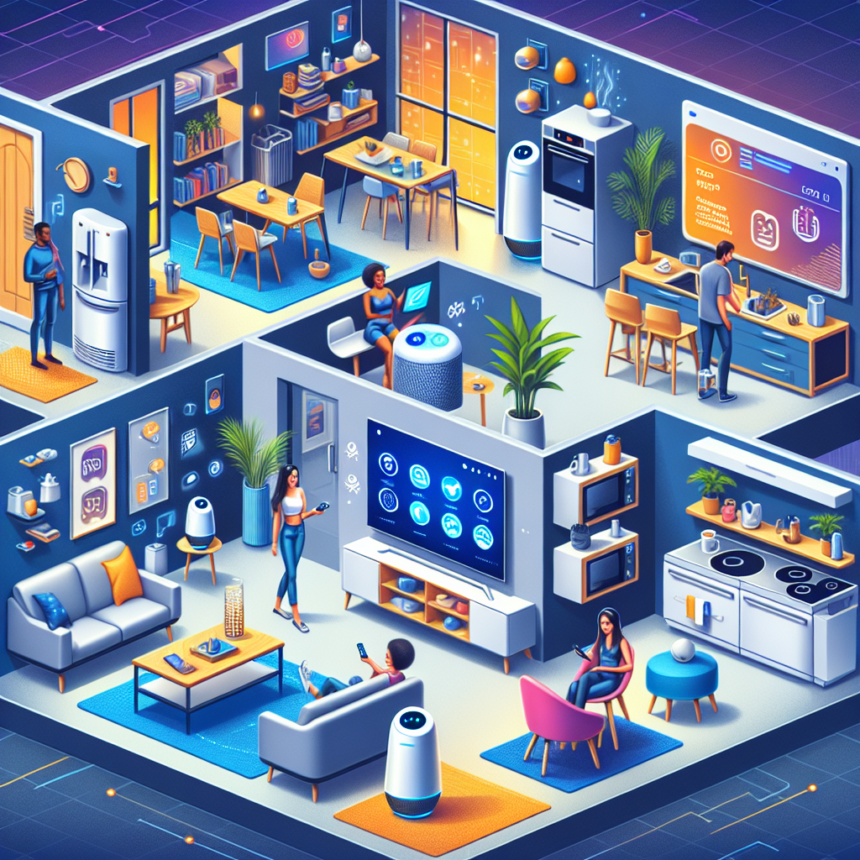The Future Is Now: How AI-Powered Home Assistants Are Reshaping Our Lives
In recent years, the rise of artificial intelligence (AI) has transformed many aspects of everyday life. Among the most prominent AI applications are home assistants—smart devices that have quickly evolved from novelties to essential tools in our homes. AI-powered home assistants, like Amazon’s Alexa, Google Assistant, and Apple’s Siri, are reshaping how we manage our daily tasks, optimize our living spaces, and even enhance our entertainment experiences. As technology continues to advance, it’s crucial to examine how these smart devices are influencing our lives.
Streamlining Daily Routines
At the heart of the appeal of AI-powered home assistants is their ability to simplify and streamline daily routines. These devices can perform a myriad of tasks at voice command, allowing for increased efficiency in managing household chores. From setting timers and reminders to controlling smart appliances, home assistants free up valuable time that can be better spent on personal or family activities. According to a study by McKinsey, AI could automate 30% of the hours worked globally, significantly affecting the future of productivity.
Imagine waking up in the morning and having your home assistant prepare a coffee automatically, read out your scheduled appointments, and adjust the thermostat to your desired temperature—all before your feet hit the floor. Tasks like these create an environment where technology enhances comfort and efficiency, encouraging a more organized and less stressful lifestyle.
Enhancing Home Security
Beyond daily routines, AI-powered home assistants contribute significantly to home security. Many of these devices integrate seamlessly with smart security systems, allowing users to monitor their homes remotely. Voice-activated commands can lock doors, turn on lights, or activate security cameras, providing peace of mind whether you’re at home or away.
Moreover, AI’s analytical capabilities improve the effectiveness of security systems. For instance, smart cameras can utilize facial recognition to differentiate between family members or strangers, sending instant alerts if an unknown figure is detected. Integration with smart doorbells can enable real-time video feeds to mobile devices, allowing homeowners to respond promptly to potential threats. This level of control not only enhances safety but also deters potential intruders.
Personalized Experiences
Another significant way AI-powered home assistants are reshaping our lives is through personalization. These devices can learn user preferences over time, tailoring recommendations based on past behavior. For instance, they can create customized playlists based on your musical tastes, suggest recipes based on dietary restrictions, and even control the ambiance of your home by adjusting lighting based on your preferred mood.
Additionally, these assistants can provide personalized news updates, tailored reminders, and context-aware suggestions, effectively acting as an intelligent companion. This personalization aids in fostering a stronger bond between the user and technology, making interactions feel more organic and less transactional.
Driving Sustainable Living
As the world increasingly prioritizes sustainability, AI-powered home assistants are also contributing to greener living. Smart energy management is one of the key features these devices offer, allowing users to monitor energy consumption and make informed decisions about their living habits. For example, smart thermostats can learn user patterns and adjust heating and cooling systems accordingly, leading to reduced energy consumption.
Furthermore, integration with smart appliances can help users conserve water and electricity, while monitoring environmental impacts. With technology encouraging conscientious usage of resources, AI can play a pivotal role in driving sustainable practices across households.
Conclusion
The future is indeed now, and AI-powered home assistants are significantly reshaping our lives in various ways, from enhancing convenience and security to fostering innovative and sustainable practices. However, as with any technology, it is essential to approach these advancements thoughtfully. As we embrace the benefits of smart home technology, we must also consider privacy and security implications, ensuring that our data remains safe while enjoying the conveniences these devices offer. The integration of AI into our homes has only just begun, and its potential is boundless.
FAQs
Q1: What are some popular AI-powered home assistants?
A1: Some popular AI-powered home assistants include Amazon Alexa, Google Assistant, Apple Siri, and Microsoft Cortana.
Q2: How do AI home assistants enhance home security?
A2: AI home assistants enhance security by integrating with smart security systems, enabling users to monitor and control security features such as cameras and smart locks from their devices.
Q3: Can AI-powered assistants learn my preferences?
A3: Yes, AI assistants can learn your preferences over time, allowing them to provide personalized recommendations for music, recipes, and more.
Q4: Are there privacy concerns with using AI home assistants?
A4: Yes, there are privacy concerns, as these devices often collect data to improve functionality. It’s important to review privacy settings and understand data usage policies.
Q5: How do AI home assistants contribute to sustainability?
A5: They help manage energy consumption by allowing users to monitor and control smart appliances and systems, leading to more efficient use of resources.











